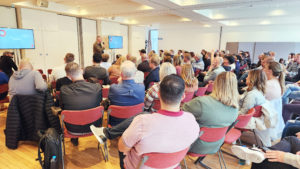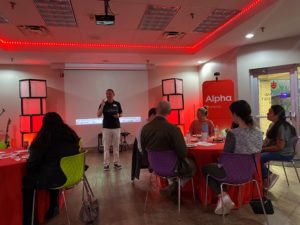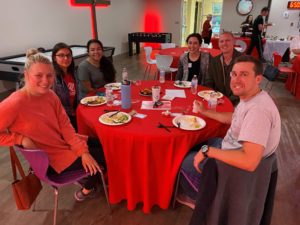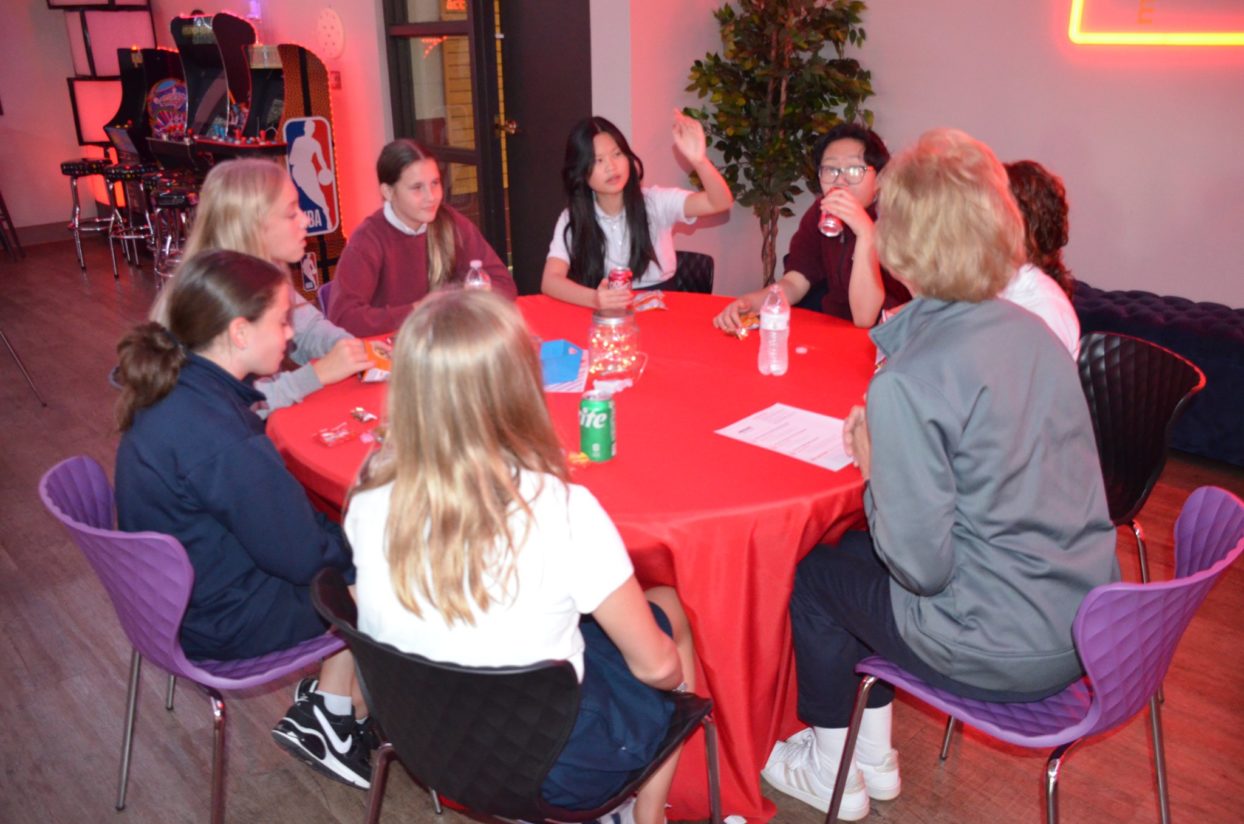Cathedral minister attends international conference focused on discipleship
By Emily Booker
What is the meaning of life? Who is God? Will believing in Jesus make me happy?
If someone on the street were to ask you those questions, how would you answer? And do you think your answers would lead that person into becoming a disciple of Christ?
Just how do we engage people in sincere, productive conversations about faith?
That was the motivation for Rick Grinstead, director of youth and young adult ministry at the Cathedral of the Most Sacred Heart of Jesus, when he attended the Alpha Conference in London this fall.

Attendees listen to testimonies and speakers at the Alpha Conference in London. More than 200 people from around the world attended the gathering in September.
More than 200 people from as far away as Mexico, Australia, Japan, Switzerland, and the United States gathered at the end of September to learn about the Alpha course, examining culture, and making lifelong disciples of Christ.
Alpha is a several-week course that began at Holy Trinity Brompton Parish in London in the late 1970s as an introduction to the most basic beliefs of Christianity. In the 1990s, Nicky Gumbel, then vicar of the Anglican parish, developed it into a format that could be run all over the world and in all sorts of settings.
Through a series of videos, the course still introduces some key concepts of Christianity while encouraging participants to reflect on their own beliefs and form bonds with others through small group conversation.
In a typical Alpha meeting, people gather at tables or in small groups and share a meal together. After the meal, there is a video that introduces a topic and asks questions. Then those at the table have an opportunity to discuss the questions together. There is no right answer; the point is simply to facilitate conversation and slowly introduce concepts of faith, God, and meaning.
Like its name, Alpha starts at the very beginning. It does not assume that anyone attending believes in God or has any knowledge of who Jesus is. Early questions are something anyone could answer: “What makes you happy?” “Assuming God does exist, what’s the first question you would ask him?”
Over the 10 or so sessions, the program slowly introduces what the Church believes, and the questions dig deeper, like “Who is Jesus in your life?” There are video series that address the style and needs of different demographics, like youth or married couples. Although started by an Anglican ministry, there is now a Catholic division that presents the faith in a Catholic context and features prominent Catholic figures like Pope Francis and Cardinal Raniero Cantalamessa, OFM Cap, the preacher of the papal household.
Mr. Grinstead was introduced to Alpha about 10 years ago.
“Alpha is really a series of conversations about the Christian faith, but in a low, easy environment that allows people to genuinely ask any question they want, to also not ask any question at all,” he said. “It’s really an opportunity to come together and explore life’s biggest questions, the meaning of faith, is there more to life than this?”
Although geared toward people who may have no knowledge of the Christian faith, Mr. Grinstead finds that any Christian can benefit from going back to the fundamentals and having honest conversations with others.

Rick Grinstead of Sacred Heart Cathedral, who attended the conference, leads an Alpha session for young adults at the cathedral. He has begun Alpha sessions for different age groups.
“When I experienced it, it really kind of changed me, because my undergrad (degree) is in theology, I’m receiving my master’s in theology, and yet every time I experience these videos with other people I still learn more about my faith,” he remarked.
The Alpha Conference was held at Holy Trinity in London. Mr. Grinstead noted that the culture of the parish community was immediately a stark contrast to the broader culture of the big city.
“People as you would walk down the street, nobody looks at you, nobody pays attention to you, everybody’s got earbuds in, and they walk by without ever engaging, looking, making eye contact,” he said. “London is different from most of England, obviously, but when we got onto campus, all we met were people who were engaging. They genuinely wanted to hear from you. And there is a big difference in that. I found that the culture there was a genuine accompanying culture, where they cared enough to journey alongside you. It felt like you were at home.”
Noting the culture around you, in your surrounding community and your parish, was a big part of the conference. There is no one way to mission to people, because people and cultures are different. Even Alpha, using the same videos and same format, will look different in different places. And sometimes a ministry or parish has to change its culture in order to look outside itself and welcome others.
“You have to really look at your culture: what do you value, what are your values, and are you OK with those values, or would you like to see other values? Changing culture is hard. It’s a very difficult thing, but it is absolutely worth it,” Mr. Grinstead said.
Prayer was another big component of the conference.
He recalled attending a staff meeting at Holy Trinity and finding the entire meeting infused with prayer and optimism. Prayer wasn’t just a part of opening or closing the meeting; it encompassed the entire meeting.
“I think their idea of prayer really impacted me,” he said. “Prayer isn’t just for messed-up people; it’s for everyone. And prayer isn’t something that you do; it’s something you experience. I think it is a mind-shift.
“If you invite the Holy Spirit to come, this sense of change is expected. If you’re going to invite the Holy Spirit in and truly want the Holy Spirit to change things, then you better live in anticipation knowing that something is going to happen.”
Mr. Grinstead was chosen as one of a handful of attendees who was able to address the parish staff and share his experience about life and ministry in Knoxville.
Conference attendees also got to witness an Alpha session at Holy Trinity. The large church created cozy, small-group areas with sofas and chairs and welcomed around 600 people for the kickoff session of a new Alpha series.
“To witness 600 people come in who don’t go to church and just start to explore if there’s more to life than this busyness of airpods and money and status and all these things, it was breathtaking to say the least,” Mr. Grinstead said. “So, we got to experience that. But then we got to unpack that as well. What does that look like, and how could that start in your area, wherever you’re at, whatever that looks like?”
Mr. Grinstead believes that the principles of Alpha can be applied to any ministry; hospitality, listening, and building relationships are always important in creating disciples of Christ.
“Making sure that people feel comfortable enough to either share or not share is really important. Building relationships over winning arguments is key,” he said.
He has run Alpha in churches, but also out of homes, in bars, and in prison. He said that when Alpha is run outside of a church setting, it’s truly meeting people where they are, reaching people who may not feel comfortable in a church but are open to talking about the meaning of life.
It is not the content of the videos that makes the program different, Mr. Grinstead noted. It’s the structure that allows for people to enter into conversations about belief, Christ, and the Church. For many, talking openly about faith with others can seem intimidating.
“This is a way for Catholics to better evangelize or maybe even begin to evangelize the people in their lives,” Mr. Grinstead said. “Catholics, if we’re just honest, we haven’t been the greatest evangelizers. That’s not in our wheelhouse, typically. So, what are some easy wins for us in terms of inviting people into church life or entering into a relationship with the Lord?”
Ultimately, Mr. Grinstead has found that Alpha is about starting a conversation and asking questions and not being concerned with answers. If someone is seeking the Lord, the answers will come eventually. But you have to start with the questions.

Participants share a meal at an Alpha session at Sacred Heart Cathedral earlier this year. Sharing a meal together is an important part of the Alpha program.
“We allow for a space for people to come with genuine questions and be OK with that. Try to trust the process of we don’t have to answer all the questions at once,” he said. “You know, you don’t tell a new believer all the rules and regulations right away for them to follow; you help understand why you even have rules and regulations. So, that was the beauty of it.”
For Mr. Grinstead, Alpha is just another way to introduce people to Christ and build a relationship with Him. The most important thing is that people find Christ, and even lifelong Christians continue to seek Him.
“Even if you’ve been a lifelong Catholic, or a lifelong Christian of some kind, exploring your faith should be a continual process,” he said.
“It’s never ‘Oh, I’m good; I took religion class in middle school and high school and go to church every Sunday, so I’m good.’ No. It is a lifelong process. It’s a relationship. It’s not just a head knowledge thing. Where has my relationship with God moved at all in the last year? Has that dial even shifted? I think that’s a huge thing to look at,” he added.
Another takeaway from the conference was looking at the role of the parish in welcoming and creating those disciples.
“What is the purpose of church? What is the purpose of us having a church? It’s really to bless the city. That is why we’re here,” he said.
Mr. Grinstead is currently running several Alpha sessions at the Cathedral of the Most Sacred Heart of Jesus aimed at different groups, including youth, young adults, and teachers. He’s looking forward to starting one for married couples.
In particular, he’s found that using Alpha in confirmation preparation has really helped kids think about their personal beliefs and open up in talking about faith. It levels the playing field and doesn’t assume every child in confirmation class has had the same religious education or comes from a family that regularly attends Mass or prays.
“We recently had the first session, and I’ve done confirmation prep for a long time, and I have used Alpha Youth before, but it’s been a while,” he said. “I don’t remember having such great conversations, more listening sessions, from the youth than we did on our very first session. The very first one, they opened up, and they just did tons of questions, and they had tons of ideas of who God is.”

